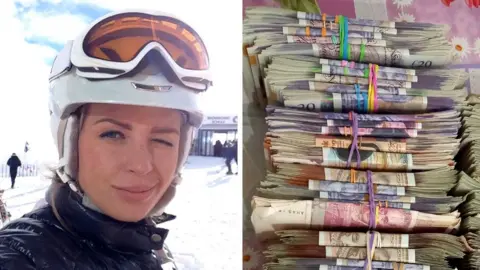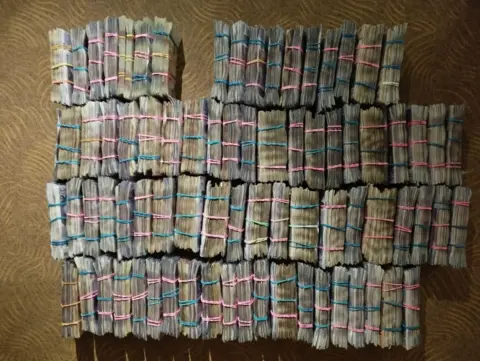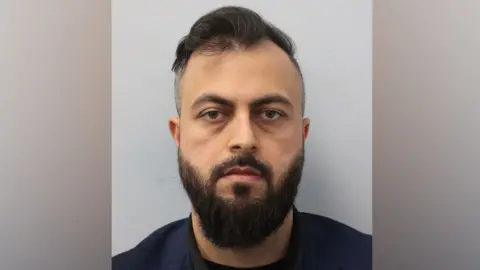Russian criminals helped UK drug gangs launder lockdown cash
 NCA
NCAA multi-billion-dollar money laundering operation that formed when UK gangs were struggling to offload cash during lockdown has been uncovered by the National Crime Agency.
Discovering the Russian-speaking network embedded in the UK’s street drugs market is the biggest success against money laundering in a decade, say investigators.
The global operation, based in Moscow, has been taking dirty money from crime gangs for a fee, and allowing them to exchange it for untraceable cryptocurrency, protecting drugs profits from detection. The network has also been used by the Russian state to fund espionage.
The network stretches across 30 countries, and 84 people have so far been arrested, including 71 in the UK, the NCA and its partners told reporters at a briefing earlier this week.
 NCA
NCAUK Security Minister Dan Jarvis said the operation "exposed Russian kleptocrats, drug gangs and cyber criminals - all of whom relied on the flow of dirty money".
On Wednesday, the United States Treasury sanctioned the key figures at the top of the network.
Ekaterina Zhdanova, the head of a Moscow-based cryptocurrency network called Smart, has been identified as being at the heart of the operation. She was previously sanctioned by US authorities in November 2023 for allegedly moving money for Russian elites.
Bradley Smith, Acting Under Secretary for Terrorism and Financial Intelligence for the US Treasury, said the country "remains committed to disrupting any effort by Russia to use digital assets or other illicit financial schemes to accrue, store, and transfer their ill-gotten gains".
Rob Jones, director general of operations at the NCA, said the thread connecting Russian elites, crypto-rich cyber criminals and UK drugs gangs had been “invisible until now”.
“We have identified and acted against the Russians pulling the strings at the very top,” he continued, adding that the NCA had now made it “extremely difficult” for the key players to operate.
Clues found during pandemic
The trail that led to the enormous and complicated network was spotted during the 2021 pandemic lockdown, as drugs gangs across Europe struggled to move piles of cash from street sales into the legitimate economy.
That, in turn, made it harder for them to buy in more produce, such as cocaine from South America.
The NCA says two cryptocurrency networks based in Moscow, known as Smart and TGR, offered a solution.
Both were sitting on large piles of cryptocurrency from ransomware attacks. That’s a form of online extortion in which a gang paralyses an organisation’s computer systems until it pays a fee to regain control.
TGR and Smart took the profits from those attacks and struck a deal with British drugs networks, giving them an almost instantaneous way of converting dirty street money into a useable asset.
 NCA
NCAIn return for taking on the risk of receiving the cash, the Russian-led network charged commission. Its network of couriers would launder the cash, pushing it through seemingly legitimate businesses like construction firms in the UK and elsewhere, or using mules to fly it in baggage to Dubai.
Ultimately, the cash re-entered the economy as it was paid into bank accounts as seemingly legitimate profits.
In effect, Smart and TGR were mimicking a legitimate bank, by charging a small fee for providing a network to move money from country to country.
The first clue came when police stopped Fawad Saiedi, a drugs profits courier, in 2021. He was carrying £250,000 in his car.
He later admitted co-ordinating the move of £15.6m of dirty money and he was jailed for more than four years.
 NCA
NCAAs the NCA dug deeper, they found he had been working for Ekaterina Zhdanova, the head of the Smart cryptocurrency exchange service in Moscow.
The NCA then detected an identical pattern around the country of links between people involved in the drugs trade and those involved in crypto. They also saw further links to the notorious Kinahan drugs cartel that has its origins in Dublin and a base in the United Arab Emirates (UAE).
Drug profits couriers identical to Saiedi’s operation were collecting cash from gangs after setting up a simple system to ensure they could trust each other and make the transfers happen quickly.
As soon as the cash was confirmed as passed to a courier, the equivalent in cryptocurrency, provided by the Russian Smart and TGR networks, was sent to a drug gang’s secret online accounts. That crypto in turn could then be used to buy cocaine in bulk from South American cartels.
Investigators identified one group of couriers collecting cash from 55 different British locations over four months on behalf of at least 22 gangs - and signs of identical schemes elsewhere in Europe.
 NCA
NCAAnother UK-based courier network was run by Semen Kuksov, the son of a Russian oil executive. He and his associates collected more than £12m in drugs cash in just 10 weeks to be exchanged for virtual currency. Last February, he was jailed for almost six years.
So far, the NCA and its partners have seized £20m in cash, relating to an estimated £700m in drugs sales - and the vast majority of the arrests and charges so far are of couriers like Saiedi and Kuksov.
Rob Jones from the NCA said: “If you're somebody now wanting to move money from a drug deal, which has been responsible for real harm in the UK, you're going to think twice, because you don't know whether that courier has been compromised.
“You don't know whether we're following them, and you don't know where those proceeds of crime are going to end up.
“We are anticipating where this trade will go next, and we will be ahead and waiting.”
Sanctions and espionage
Wednesday’s US sanctions are the final stage in exposing the network, by targeting the people at the top.
The US office of Foreign Assets Control said it had sanctioned the head of TGR, Russia-born Ukrainian national George Rossi, also known as Georgy, and his second in command, Elena Chirkinyan, a Russian national.
Rossi has presented himself as being a legitimate businessman based in London, but his whereabouts are unclear.
The US Treasury says Ekaterina Zhdanova and other members of the TGR network used cryptocurrency and British financial services to move £2m into the UK to buy property for a Russian national, who has not been publicly named. The NCA has not revealed whether it has taken action to seize that property.
However, Zhdanova's alleged role in assisting sanctioned individuals is just one part of what the NCA says are her links to Moscow.
Investigators say that, in 2022, the Russian state used the Smart and TGR crypto-exchange services to move funds for espionage.
Then, in 2023, the NCA says the scheme helped the state-controlled Russia Today media platform, banned in the UK, move cash into the country for one of its operations.
